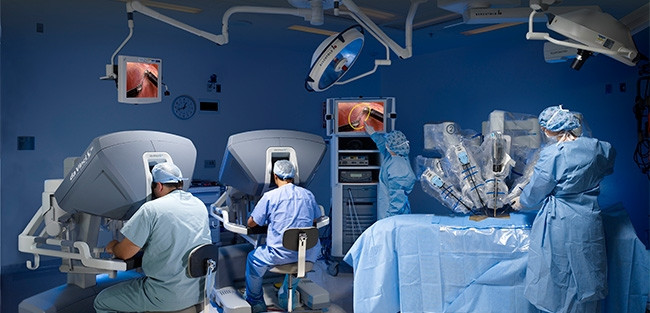
Robotic surgery is fast becoming the norm for cancer procedures in SA because of the precision minimum invasive benefits for patients with prostate cancer.
This is according to Dr Vipul Patel, one of the world's top urologists, who was in SA for a three-day conference hosted by The Urology Hospital (TUH) in Pretoria last week.
Patel notes robotics is now the standard care for many urological cancer procedures in the US, adding with robotic removal of cancerous kidneys set to be introduced in SA, the African continent and SA is on the cusp of a revolution in cancer treatment.
The Urology Hospital is set to undertake the country's first robotic partial nephrectomy in November, paving the way for further procedures once approved by medical aids.
As doctors and patients have embraced this advanced technology, robotic surgery is revolutionising the effectiveness of specialised surgery and the recovery process, says The Urology Hospital.
Dr Lance Coetzee, Urologist at The Urology Hospital in Pretoria, says robotic-assisted surgery is the future of treating prostate cancer in SA and will reduce hospitals' mortality rates.
Robotic surgery was introduced to SA at TUH two years ago. Since then, 700 prostatectomies have been undertaken in the country.
TUH urologist Dr Frans van Wijk says robotic kidney procedures would have similar benefits to robotic prostatectomies.
"Robotics is the most minimally invasive surgery available, resulting in much quicker recovery time, much lower blood loss and far less pain."
There are only four hospitals equipped to perform robotic surgery in SA - The Urology Hospital in Pretoria and Netcare Waterfall City Hospital, Midrand, Netcare Christiaan Barnard Memorial Hospital and Mediclinic Durbanville in Cape Town.
Meanwhile, recent research points out despite widespread adoption of robotic systems for minimally invasive procedures, a non-negligible number of technical difficulties and complications are still being experienced during these procedures.
The adoption of advanced techniques in design and operation of robotic surgical systems may reduce these preventable incidents in the future, it says.
The study was done by researchers at the University of Illinois at Urbana-Champaign, the Massachusetts Institute of Technology and Chicago's Rush University Medical Centre.
Share